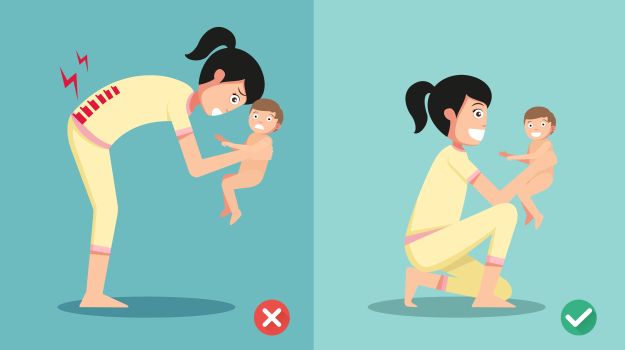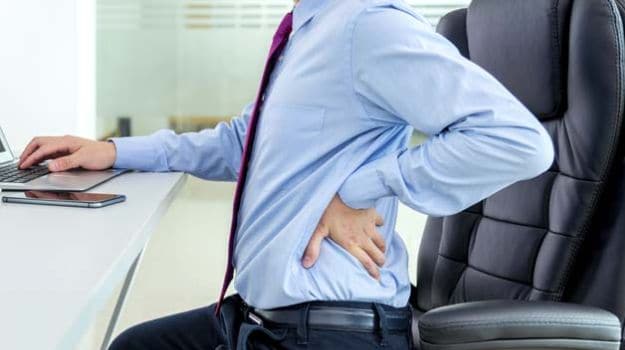According to experts, back pain is associated with the way our bones, muscles and ligaments in our back work together. Dr. Manoj K. Ahuja from Sukhda Hospital says, "Lower back pain may be linked to the bony lumbar spine, lower back muscles, discs between the vertebrae, ligaments around the spine and discs, spinal cord and nerves, abdomen and pelvic internal organs, and the skin around the lumbar area. Pain in the upper back may be due to spine inflammation, disorders of the aorta and tumors in the chest.
8 Back Pain Causes
What could be triggering your back pain? To get an idea, we spoke to experts about the most common causes of back pain. So before you reach for that painkiller, it's time you find out what's actually causing the pain.
Here are the most common back pain causes -
1. Strain
- Strained Muscles and Ligaments: "The muscles between your shoulder blades, the Rhomboid and Trapezius muscles, work hard to keep your head straight in line with the centre of gravity. When these muscles are strained, you need to soothe them. Else it may lead to knots which are caused by the lactic acid deposit. Similarly, when you use one of your arms more often than the other to do day-to-day chores, your body weight tends to shift and it becomes less flexible. Such skeletal imbalances can affect your spine muscles and nerves," explains Zubin Atré, founder of AtréYoga Studio in New Delhi.
- The result of an abrupt and awkward movement
- A muscle spasm
- Lifting something that is too heavy or improperly. Dr. Supriya Bali adds, "You can experience severe pain in the lower back after lifting a heavy object. You can even strain your back while picking your baby up from the floor. Note: The proper technique is to use your legs instead of your back. Do not bend from the waist. Instead, squat down by bending your knees and use your legs to lift".

2. Structural Problems
- Ruptured disks (also known as a slipped disc or herniated disc): Each vertebra in our spine is cushioned by disks. If the disk ruptures there will be more pressure on a nerve, resulting in back pain.
- Bulging disks: Similar to ruptured disks, a bulging disk can result in more pressure on a nerve leading to back pain.
- Sciatica: Due to a bulging or herniated disk pressing on a nerve, one can experience a sharp and shooting pain that travels through the butt and down the back of the leg. This condition is called sciatica. Dr. Supriya Bali says, "If you continue to feel this tingling sensation, please contact a doctor".
- Arthritis: Patients with osteoarthritis commonly experience problems with the joints in the hips, lower back, knees and hands. In some cases spinal stenosis can develop i.e. the space around the spinal cord narrows.
- Abnormal curvature of the spine: "If the spine curves in an unusual way, the patient is more likely to experience back pain. For example: Scoliosis, when the spine curves to the side", says Dr. Manoj K. Ahuja.
- Osteoporosis: Bones, including the vertebrae of the spine, become brittle and porous, increasing the chance of compression fractures.
- Spondylolisthesis: Normal wear and tear makes it hard for joints and ligaments to keep the spine in proper position, especially with age. When a vertebrae moves more than it should, it can slide forward and on top of another. When this happens, bones can press on the spinal nerves and cause lower back pain.
Here are some other back pain causes -
3. Cancer of the spine: A tumor located on the spine may press against a nerve, resulting in back pain.
4. Sleep disorders: Aches and pains give everyone a sleepless night every now and then, but did you know that individuals with sleep disorders are more likely to experience back pain, compared to others? According to PubMed, US National Library of of Medicine, "There is a significant relationship between pain and sleep with a 55% increase in the proportion of subjects reporting restless sleep after the onset of back pain".

5. Cauda Equina Syndrome: The Cauda Equina is a bundle of spinal nerve roots that arise from the lower end of the spinal cord. People with Cauda Equina Syndrome feel a dull pain in the lower back and upper butt, as well as lack of feeling in the butt, genitalia and thigh. There are sometimes bowel and bladder function disturbances.6. Bad mattress: "There is a greater risk of developing back pain if the mattress does not support specific parts of the body", adds Dr. Manoj K. Ahuja.
7. Pregnancy: "The lower back becomes a target area for pain during pregnancy due to the weight you naturally gain and changes in posture as your bump grows", says Dr. Supriya Bali.

8. Everyday Activities or Poor Posture: "Bending awkwardly, pushing or pulling something, standing or bending for long periods, twisting the torso, coughing or sneezing often, muscle tension, overstretching, sitting in a hunched position (such as driving) for long periods - all can result in back pain", says Dr. Supriya Bali, Max Hospitals.








